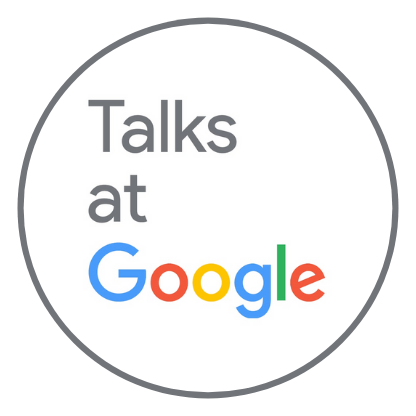The Moral Molecule | Paul Zak | Talks at Google
Reference: Talks at Google. (2015, March 24). The Moral Molecule | Paul Zak | Talks at Google [Video]. YouTube.
We Make Your Education Count

Get the Credit You Deserve and Become the Most Attractive Job Candidate by Earning and Posting A+ Badges to Your Linkedin Profile.
Sign Up to Get Started at Accredicity
Using GROW Model for Problem Solving and Decision Making | The Mission Continues
 34 Creds - Leadership
34 Creds - Leadership
Unlocking the Science: "From 'Moral Molecule' to High Performance: The Neuroscience of Trust with Dr. LovePaul Zak, scientist, author, and speaker, recently visited Talks at Google to discuss his discovery of oxytocin, also known as "The Moral Molecule". In 2004, his lab discovered that oxytocin allows us to determine who to trust, and his work on oxytocin and relationships has earned him the nickname "Dr. Love". He talked about how to measure organizational trust, policies that will increase trust, and how this affects organization's goals. He discussed the need to start with the idea of people at work as volunteers, understanding social neuroscience to create cultures for high engagement and high performance, and his POP model of people, organization, and purpose. Learning Outline1. Hire smart people for the right cultural fit. Instructional ContentPaul Zak, scientist, author and speaker, has spent many years studying the effects of oxytocin, also known as the "Moral Molecule". Oxytocin has been found to allow us to determine who to trust and has the potential to play a major role in how we interact with one another. In his "Talks at Google" video, Zak discusses how to measure organizational trust, policies that will increase trust, and how this affects an organization's goals. Zak suggests that the way to create a culture of high engagement and high performance is to think of employees as volunteers who are choosing to work together on projects in the organization. He proposes using neuroscience to build a foundation for understanding cultures and people, instead of relying on traditional philosophical models of decision making. Zak's research has identified eight classes of policies that can be used to increase trust in an organization. These range from creating systems of recognition, to creating a sense of purpose and belonging, to introducing policies that encourage collaboration and teamwork. He also stresses the importance of hiring the right people for the right cultural fit. By understanding the power of oxytocin and implementing the right policies, organizations can create an environment of trust and high performance. Paul Zak's research provides us with insight into how to build strong, productive cultures in the workplace. Leadership
|

Dr. Paul Zak is an expert on the "Moral Molecule", which is a special chemical in the brain called oxytocin. It helps us to figure out who we can trust, and it's what makes us feel love and care for others. He did a talk at Google to explain how to use neuroeconomics to measure how much trust there is in an organization and how to improve it. He compares it to going to dinner with friends: you don't have to pay them for their hospitality because you enjoy their company. He also uses a Morgan Freeman video to explain the science behind it. He suggests that people should be recognized for their work in ways other than money, and that good cultures are ones where people are engaged, challenged, and appreciated. Video Quotes"Let's take that knowledge and then try to build a foundation using neuroscience to understand cultures and people who are choosing to work together on projects in cultures." - Paul Zak "Why not just measure what your brain's doing while you're making decisions. Maybe they involve money. Maybe they don't." - Paul Zak "Start thinking of a simple model that we could use in neuroscience to understand that, which I call the POP model." - Paul Zak Related Quotes"We have to be accountable to each other. We can't act as if our individual decisions are not connected to the well-being of the people around us.” -Paul Zak "When we get oxytocin, it's like a little bit of a moral jolt. We become more generous and trusting and willing to cooperate with one another, which I think is the basis for a healthy society.” -Paul Zak "I think the message is that, if we want to create a more humane and caring society, we have to recognize the biology that underpins social behavior, and design our institutions to maximize and leverage that biology.” -Paul Zak Competencies1. Integrity and Trust Learning Outcomes1. Analyze oxytocin’s role in increasing trust in organizations and its effect on productivity. 2. Evaluate the benefits of a people-focused culture in the workplace. 3. Compare and contrast the “golden rule” and the “anti-golden rule” in decision-making. 4. Create a model to apply neuroscience to understanding organizational cultures. 5. Assess the effectiveness of Morgan Freeman’s role in “Through the Wormhole” in presenting the scientific experiments. 6. Synthesize the eight classes of policies that can increase trust in organizations. Sample Answers1. In this video, I learned that oxytocin, also known as the 'Moral Molecule', allows us to determine who to trust. Additionally, Dr. Zak discussed how to measure organizational trust and the policies that can increase trust. Lastly, he discussed how this affects an organization's goals. 2. Dr. Zak also discussed the importance of creating a positive culture in the workplace. He suggested that employees should be treated as volunteers and be provided with recognition and challenge. He believes this will lead to high engagement and performance. 3. Finally, Dr. Zak presented his POP model, which includes the elements of people, organization, and purpose. He explains that all three elements need to be accounted for in order to create an effective work environment. He also discussed the importance of hiring the right people with the right cultural fit. Paul ZakPaul Zak is a professor of economics, psychology, and management at Claremont Graduate University and founding director of the Center for Neuroeconomics Studies. He is an expert on The Moral Molecule because he has conducted groundbreaking research on oxytocin, a hormone in the brain that has been linked to trust, empathy and other prosocial behaviors. He is also the author of "The Moral Molecule: The Source of Love and Prosperity". Paul Zak is associated with the Center for Neuroeconomics Studies at Claremont Graduate University and you can learn more about him and his work here. AssessmentQ: According to Paul Zak, what is the model for understanding why some organizations reach high performance and others don't? QuestionsCommon Questions: Real-Life Examples and Scenarios: Keywordsoxytocin release, "neuroeconomic studies", "Center of Neuroeconomic Studies", "Organizational Trust Policies", "Moral Molecule Source", "Source of Love Prosperity", "High Engagement Performance", "Voluntarily Come Together", "Social Networking Oxytocin", "Neuroeconomic Decision Making" Facts1. Paul Zak's lab discovered the 'Moral Molecule', oxytocin, in 2004. Trends1. Create an Oxytocin-Release Incentive Program: Develop a program that rewards employees for activities that help increase oxytocin release. Examples of activities could include team-building exercises, volunteering, or simply spending time with co-workers. 2. Develop a Neuroeconomic-Based Team Building Exercise: Design a team-building exercise that is based on the principles of neuroeconomics. This could be a task that requires cooperation and collaboration in order to achieve a certain goal. 3. Develop a Neuroeconomic-Based Hiring Process: Create a hiring process that is based on the principles of neuroeconomics. This could include using brain-based tests and assessments to identify the most suitable applicants for a job position. 4. Create an Oxytocin-Release Reward System: Develop a reward system that is based on oxytocin release. This could include rewards for employees who demonstrate a high level of trust, cooperation, and collaboration with their co-workers. SourceThis learning instructional guidance was formulated using the GPT-3 language model created by OpenAI. ShareOxytocin, the "Moral Molecule," helps us determine who to trust. Dr. Paul Zak's research on oxytocin & relationships has earned him the nickname "Dr. Love"! His talk reveals how to measure organizational trust & policies that increase trust, leading to better org goals. #Neuroeconomics #DrLove #Trust #OrganizationalGoals 🤝 @Accredicity |












